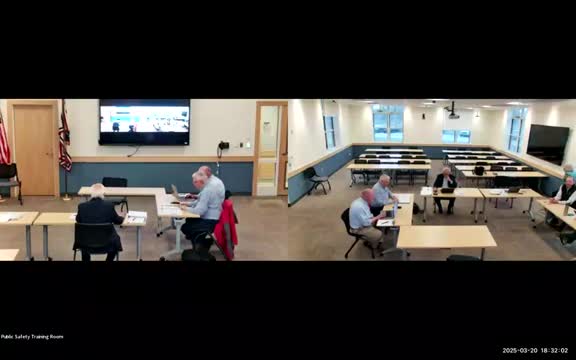Southborough committee backs two grant applications to study Route 9 wastewater capacity and downtown sewer options
Get AI-powered insights, summaries, and transcripts
Subscribe
Summary
The Town of Southborough Wastewater Study Committee voted unanimously June 20 to submit two state expressions of interest seeking funds to define disposal capacity for candidate sites along Route 9 and to develop a wastewater plan for the downtown/village business district after a presentation from Lombardo Associates.
The Town of Southborough Wastewater Study Committee voted unanimously on June 20 to authorize two Expressions of Interest (EOI) to state development programs to fund near-term engineering work to define wastewater disposal capacity along Route 9 and to develop and implement a wastewater plan for the downtown/village business district.
The decision followed a presentation by Pia Lombardo, consultant with Lombardo Associates, who summarized the firm’s Route 9 Wastewater Management Action Plan and recommended a short list of next steps the town should pursue to make wastewater-driven redevelopment financially feasible. Lombardo emphasized that “disposal capacity really defines what you got” and argued the town should focus on hydrogeologic assessments and targeted, implementable pilot projects rather than only longer, costly comprehensive planning studies.
Why it matters: Committee members said wastewater capacity is a gating issue for higher-density commercial and mixed-use development along Route 9, which the town has identified as a primary economic asset. Committee members and the consultant framed the work as a business-minded step to attract developers while minimizing new burdens on property taxpayers.
Lombardo’s recommendations and evidence Lombardo reviewed alternatives to conventional deep gravity sewers—so-called decentralized or cluster systems that use septic-tank-effluent pumping, grinder pumps, or shallow pressure mains—and listed potential assets the town could use or test, including golf-course irrigation, unused capacity at local school treatment systems, and existing privately owned groundwater discharge systems (notably a property the presenter identified as having roughly 50,000 gallons per day of capacity). She said alternative collection technologies and connecting to existing treatment capacity can reduce costs compared with conventional sewers by avoiding deep trenching, manholes and full road reconstruction.
Lombardo cautioned that hydrogeologic and groundwater-disposal feasibility studies are required before a project can proceed and estimated such studies for some sites could cost on the order of "$200,000" (approximate) and that testing and permitting for groundwater discharge systems can become more expensive if DEP involvement and reservoir-protection issues arise. She told the committee that the project should be cash-flow positive to be viable and recommended pursuing state grants and innovative financing rather than relying solely on property tax increases.
Funding, permitting and program options Committee members and Lombardo discussed the state’s one-stop economic development grants and MassDevelopment programs as likely funding routes; Lombardo and staff also mentioned MassDEP as the regulator for groundwater discharge and Dan Kropatska at DEP as a regional contact. The group also discussed alternative financing tools including tax-increment-style district improvement financing as a potential long-term funding mechanism for infrastructure tied to new development, with town staff noting that the district improvement financing option “is not free money” but can reallocate incremental tax revenue to infrastructure.
Pilot-project approach and candidate sites Lombardo urged the committee to pursue a mix of early, small, demonstrable projects (for example, a Village Business District cluster system under 10,000 gallons per day that could be implemented faster and with mostly local firms) coupled with targeted hydrogeologic studies at larger candidate sites such as portions of the town’s golf course and select private properties. She said schools sometimes have unused discharge capacity that can be leveraged, and that drip-irrigation reuse systems have been used regionally without freezing concerns when designed properly.
Committee action and next steps After discussion, the committee approved submitting two EOIs to the state: (1) an EOI to fund hydrogeologic and site-capacity assessments (to determine disposal capacity and build-out potential for candidate properties along the Route 9 corridor); and (2) an EOI for planning and implementation work for a wastewater system targeted at the downtown/village business district (to address public-health and development constraints and to facilitate mixed-use redevelopment). The committee voted by roll call: Alan Balniak—aye, Brian Shay—aye, Claire Reynolds—aye, Sam Stiver—aye, Al Hamilton—aye.
The committee also agreed to pursue a project engineer of record to coordinate technical, permitting and financing work and to prepare fuller grant applications if the EOIs are favorably reviewed. Staff said they will coordinate follow-up conversations with MassDevelopment and MassDEP and that a brief committee meeting will be scheduled within about a week to review draft grant language and assignment of grant-writing responsibilities.
Quotes "Disposal capacity really defines what you got," Pia Lombardo, consultant, Lombardo Associates, told the committee.
"You need to show success. You need to prove that you know what you're doing," Lombardo said, urging the committee to pursue a near-term pilot to demonstrate feasibility and attract developer interest.
What’s next Town staff and committee members will finalize short EOI statements for the state program and follow up with MassDevelopment staff for a technical conversation; if EOIs are accepted, the committee expects to prepare and submit fuller grant applications to fund hydrogeologic investigations and a downtown wastewater implementation plan.
